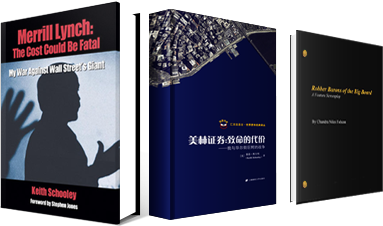ENID, OKLAHOMA, 05/10/02
When financial consultant Keith Schooley took a job with one of the largest, most respected securities firms on Wall Street, he had high hopes for a successful career. He was proud to work for a company of such high integrity as Merrill Lynch. It didn’t take long, however, for Schooley to realize Merrill Lynch’s well-cultivated reputation was not based on what went on behind the facade.
Merrill Lynch: The Cost Could Be Fatal—My War Against Wall Street’s Giant is Schooley’s detailed account of the disturbing incidents that eventually led him to a courtroom battle with the behemoth firm.
The story follows the chronological events of his experience, beginning with Schooley’s background and employment at Merrill Lynch. Schooley encountered a number of questionable events within the firm, including cheating on insurance exams. When Schooley approached his manager on how he was representing certain securities to his clients, the manager’s superior soon intervened: “He pulled a chair up to my desk, put his face within inches of mine and reprimanding me, said, ‘Don’t worry about product knowledge. Just sell.'”
Disappointed in this less-than-honest attitude and armed with new information regarding misrepresentation of broker contest results, Schooley made several “anonymous” phone calls to the company hotline. But rather than offer him protection, those Schooley spoke to in confidence reported his calls directly to his bosses. Realizing his concerns were not being taken seriously, Schooley wrote a memorandum to Merrill Lynch management and then a lengthy letter to board members.
“I had bought the image Merrill Lynch had sold me, and millions of others. I fell for it hook, line, and sinker,” Schooley confesses. “This story needs to be heard. If you buy into Merrill Lynch’s public campaign about the importance it puts on integrity and that the client comes first, well, you are sorely mistaken. I know this from my own experience.”
There were several attempts made by Merrill Lynch to quiet the whistle-blower, which were followed by Schooley’s controversial dismissal. The ensuing litigation had shocking results that didn’t bring the resolution Schooley craved.
The author hopes this book will provide valuable insight to investors, members of the financial and insurance communities, as well as to anyone in the field of employment law and human resources. He hopes too this story will inspire those with a strong sense of perseverance and a belief in standing up for what he or she believes in.
“I am not a bitter person looking to profit from revealing this story,” Schooley says. “I am just a man of conviction and principle who feels compelled to do whatever it takes to see that things are put right.”
Says well-known Oklahoma attorney Stephen Jones: “Merrill Lynch is ‘every man’s broker.’ Its reputation has, for the most part, been favorable, and it is the broker of Main Street, not Wall Street. Keith’s story, however, sheds an entirely different light on what occurred and may offer an entirely different explanation for Merrill Lynch’s success…. Keith’s experiences set forth dramatically everything that is wrong, unwise, and indeed unhealthy and unfair, about arbitration proceedings.”
Merrill Lynch: The Cost Could Be Fatal is an impressive chronicle of one man’s fierce determination to stand up for what he believes is right.
